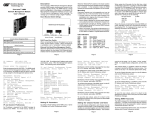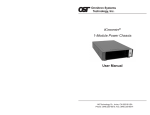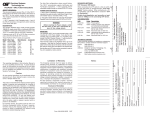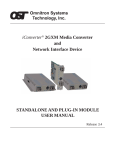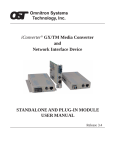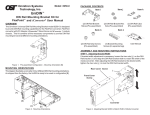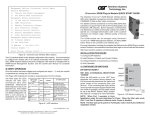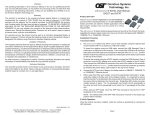Transcript
OVERVIEW: The iConverter 100Fx/Tx converters support the IEEE 802.3 Ethernet standard and converts 100BASE-FX fiber to 100BASE-TX unshielded twisted pair (UTP). Models are available for multimode (MM) and single-mode (SM) dual fiber and single-mode single-fiber. iConverter® 100Fx/Tx User Manual The 100Fx/Tx supports UTP Half-Duplex and Full-Duplex auto-negotiation with manual override and features a crossover UTP switch for easy attachment to hubs, switches and workstations. iConverter 100Fx/Tx Dual Fiber Modules Connector Types Fiber Type Distance ST SC MT-RJ LC MM 5 km 8360-0 8362-0 8364-0 - SM 30 km 8361-1 8363-1 8365-1 8367-1 SM 60 km 8361-2 8363-2 - 8367-2 SM 120 km - 8363-3 - 8367-3 iConverter 100Fx/Tx SF Single-Fiber Modules Fiber / Connector Type Distance Tx: 1310 nm, Rx: 1550 nm Tx: 1550 nm, Rx: 1310 nm SM / SC 20 km 8370-1 8371-1 SM / SC 40 km 8370-2 8371-2 For wide temperature (-40 to 60º C), add a "W" to the end of the model number. Consult factory for extended temperature (-40 to +75º C) models. When using single-fiber (SF) media converter models, the Tx wavelength on one end has to match the Rx wavelength on the other. The 100Fx/Tx can be used in an unmanaged or managed fashion. When unmanaged, it can be installed in a chassis without an iConverter Network Management Module (NMM) or iConverter 10/100M2. To be managed, an NMM module or 10/100M2 module must be installed in the same chassis. LINK MODES: In order to accommodate different user needs, the 100Fx/Tx supports three different linking modes. The Link Segment (LS) mode transmits a link signal independently of any received link at any port. Utilizing this configuration, a loss of a receive link signal will only affect the port detecting the loss of signal. All the other ports will continue to generate a link signal. For example a loss of link on the fiber port only affects the fiber port; the other ports remain unaffected [Fig 1(b)]. The Link Propagate (LP) mode transmits a link signal only when a link signal is detected. Utilizing this configuration, a loss of a receive link signal will continue to propagate through to the next port in the network. For Page 1 LED INDICATORS: LED Color Description When in the UTP Manual Negotiate “Man” position, the converter does not auto-negotiate and operates in the duplex mode selected by the UTP Full/Half-Duplex “FDX/HDX” DIP-Switch. Pwr: F/O Lk: AN: enabled FDx: UTP/Lk: When the UTP Auto/Manual Negotiate “AN/Man” DIP-Switch is in the Manual “Man” position, the UTP Full/Half-Duplex “FDX/HDX” DIP-Switch determines the duplex mode for the converter. When the UTP Full/Half-Duplex DIP-Switch is in the UTP Full-Duplex “FDX” position (factory setting), the converter operates in Full-Duplex mode. When in the UTP Half-Duplex “HDX” position, it operates in Half-Duplex mode. Set the duplex mode to match the connecting device and check for link status. Note: Attaching an auto-negotiating UTP port to a non-auto-negotiating (manual / forced / hard-coded) UTP port may result in an unpredictable port setting with excessive collisions and poor link performance. When operating in Manual mode both mating ports MUST be set manually to the same speed and duplex mode. RJ45 Crossover “= / X” Switch (Not Shown): When connecting the UTP to a hub or switch, set this front-plane switch to Straight-Through “=” (factory setting). When connecting to a workstation, set it to Crossover “X”. Page 6 The Remote Fault Detection (RFD) mode transmits a link signal only when a link signal is detected. When a loss of link is detected, this mode will perform both a loop back and propagate forward. For example, the fiber fault is looped back in the opposite direction causing the port on the other media converter to lose fiber link. It also propagates the fault forward toward the UTP port causing the switch port to lose link [Fig 1(d)]. Note: Connecting two converters set to RFD is an illegal setting and will cause a “deadly embrace” lockup. Symmetrical Fault Detection is only supported on modules with the revision of xx/08. In Symmetrical Fault Detection (SFD), the UTP port transmits a Link signal only when receiving a Link at the fiber port. The fiber port transmits a Link signal only when receiving a Link signal at both the fiber port and the UTP port. As a result, fiber faults (no Link received at the fiber) are looped back and can be reported to the network core. In addition, connecting two back-to-back converters which are both set to SFD facilitates dualloop-back, where fiber faults are reported to both ends of the network link. A blinking fiber link LED on a converter indicates a fault of the transmit fiber or UTP cables of that converter [Fig. 1(e)]. Note: Converters in SFD mode must be deployed in pairs. Page 2 and matches the duplex mode of a mating auto-negotiating device connected to its UTP port. UTP Full/Half Duplex “FDX/HDX” DIP-Switch: example, the fault at the fiber port is propagated forward causing the switch port to drop its link due to the propagated fault [Fig 1(c)]. Yellow On - Power on Green On - Link; Blink - Activity Green On - UTP Auto-Negotiation Green Green On - Full-Duplex mode On - UTP Link; Blink - Activity Page 3 100Fx/Tx SPECIFICATIONS: Protocols Copper Connectors Fiber Connectors MOUNTING AND CABLE ATTACHMENT: Controls The iConverter modules are hot-swappable and can be installed into any iConverter chassis. LED Displays 1. Using the chassis module guides for alignment, insert the module into the selected slot and secure using the front panel fastener screw. Note: Ensure that the module is firmly seated against the backplane. 2. Using a Category 5 cable, attach the UTP port to a 100BASE-TX Ethernet device. 3. Using a multimode or single-mode dual-fiber cable as required per the converter type, attach the fiber port to a 100BASE-FX mating Ethernet device. The transmit (Tx) must attach to the receive side of the mating device and the receive (Rx) must attach to the transmit side. 4. Single-fiber (SF) converters must be used in matched pairs. The transmit (Tx) and receive (Rx) wavelengths of one converter must match the receive (Rx) and transmit (Tx) wavelengths of the mating converter. For example, an 8370-1 must be connected to an 8371-1. Page 7 100Fx/Tx Model Type Dimensions 100BASE-FX, 100BASE-TX RJ-45 SC, ST, LC, MT-RJ, SFD Single-Fiber SC UTP X-over, LS/LP, RFD, UTP FDX/HDX, UTP A/N Power, FO link, UTP link, Auto, FDX/HDX W:0.85" x D:4.5" x H:2.8" Weight 8 oz. Compliance UL, CE, FCC Class A, NEBS Level 3 Power Requirement 0.7A @ 3.3VDC (typical) Temperature Standard: 0 to 50º C Wide: -40 to 60º C Storage: -40 to 80º C Humidity 5 to 95% (non-condensing) Altitude -100m to 4000m MTBF (hrs) 730,000 Page 8 LS (a) Switch 1 FRONT PANEL DIP-SWITCH SETTINGS: LS Fiber UTP UTP Fiber Converter A Converter B LS LS Switch 2 Fig. 2 Front Panel DIP-Switches (b) Switch 1 Converter A LP Converter B LP Switch 2 Converter A Converter B Switch 2 SW1 SW2 LS Normal Link Segment (LS) LP Normal Link Propagate (LP) LS RFD Remote Fault Detection + LP (RFD+LP) LP RFD Illegal Setting (c) Switch 1 Fig. 3 Link Mode Selection Table RFD+LP LP SW1 SW2 LS Normal Link Segment (LS) LP Normal Link Propagate (LP) LS RFD Remote Fault Detection + LP (RFD+LP) LP RFD Symmetrical Fault Detection (SFD) (d) Switch 1 Link Mode Converter A SFD Converter B SFD Switch 2 (e) Switch 1 Converter A Converter B Switch 2 LED Lit LED Blinking LED Off LED Status depends on connected device Link Mode Fig 4 Link Mode Selection Table for Revision xx/08 Fig. 1 Link Modes UTP Auto/Manual Negotiate “AN/Man” DIP-Switch: When this DIP-Switch is in the UTP Auto-Negotiate “AN” position (factory setting), the converter auto- negotiates Page 4 Page 5 Warning equipment, Buyer-supplied interfacing, unauthorized modifications or tampering with equipment (including removal of equipment cover by personnel not specifically authorized and certified by Omnitron), or misuse, or operating outside the environmental specification of the product (including but not limited to voltage, ambient temperature, radiation, unusual dust, etc.), or improper site preparation or maintenance. The operating description in this Instruction Manual is for use by qualified personnel only. To avoid electrical shock, do not perform any servicing of this unit other than that contained in the operating instructions, unless you are qualified and certified to do so by Omnitron Systems Technology, Inc. Warranty This product is warranted to the original purchaser against defects in material and workmanship for a period of TWO YEARS from the date of shipment. A LIFETIME warranty may be obtained by the original purchaser by REGISTERING this product with Omnitron within 90 days from the date of shipment. TO REGISTER, COMPLETE AND MAIL OR FAX THE ENCLOSED REGISTRATION FORM TO THE INDICATED ADDRESS. Or you may register your product on the Internet at www.omnitronsystems.com. During the warranty period, Omnitron will, at its option, repair or replace a product which is proven to be defective. For warranty service, the product must be sent to an Omnitron designated facility, at Buyer’s expense. Omnitron will pay the shipping charge to return the product to Buyer’s designated US address using Omnitron’s standard shipping method. No other warranty is expressed or implied. Omnitron specifically disclaims the implied warranties of merchantability and fitness for any particular purpose. Exclusive Remedies The remedies provided herein are the Buyer’s sole and exclusive remedies. Omnitron shall not be liable for any direct, indirect, special, incidental, or consequential damages, whether based on contract, tort, or any legal theory. Technical Support: For help with this product, contact our Technical Support: Phone: (949) 250-6510 Fax: (949) 250-6514 Address: Omnitron Systems Technology, Inc. 140 Technology Dr., #500 Irvine, CA 92618 USA Limitation of Warranty The foregoing warranty shall not apply to defects resulting from improper or inadequate use and/or maintenance of the equipment by Buyer, Buyer-supplied Page 9 Email: URL: [email protected] www.omnitron-systems.com Form: 040-08360-001G 9/07 Page 10

